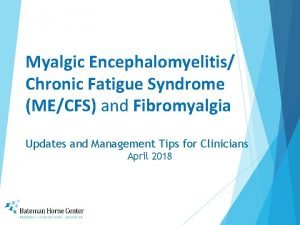Disease Register for Myalgic EncephalomyelitisChronic Fatigue Syndrome MECFS

- Slides: 1

Disease Register for Myalgic Encephalomyelitis/Chronic Fatigue Syndrome (ME/CFS) as an Opportunity to Encourage the Integrated Care of Patients ID 23451 Diana Araja 1, Elenka Brenna 2, Derek Pheby 3, Uldis Berkis 1, Asja Lunga 1 and Modra Murovska 1, (1) Riga Stradins University, Latvia, (2) Università Cattolica del Sacro Cuore, Italy, (3) Buckinghamshire New University, United Kingdom Introduction Results Myalgic Encephalomyelitis/Chronic Fatigue Syndrome (ME/CFS) is a poorly understood, serious, complex, multisystem disorder, characterized by symptoms lasting at least six months, with severe incapacitating fatigue not alleviated by rest, and other symptoms, many autonomic or cognitive in nature, including profound fatigue, cognitive dysfunction, sleep disturbances, muscle pain, post-exertional malaise, which lead to substantial reductions in functional activity and quality of life. This disease requests a complex approach and multidisciplinary integrated care of patients. A 2002 review of disease registers in England asserted that in chronic diseases an accurate well-maintained register is a prerequisite to providing comprehensive and coordinated care. In accordance with ISPOR (International Society for Health Economics and Outcomes Research) a patients registry is defined as a perspective observational study of subjects with certain shared characteristics, which collects ongoing and supporting data over time on well-defined outcomes of interest for analysis, reporting and patients monitoring. Registries are intended to investigate a complementary set of issues around a clinical scenario that cannot be properly evaluated or assessed in the artificial environment of a traditional controlled trial. Patients registries are often designed and launched to observe real world treatments and related clinical outcomes among patients with a specific disease, or among patients receiving a specific treatment. Patients registries can provide important support for health economic analyses by supplying outcomes data (and standardized health state ratings such as the EQ-5 D) for patient populations, including subgroups not previously studied, or over longer periods of time. The goals of a registry may relate to basic research, evaluation of outcomes associated with different interventions (effectiveness, safety, patients-reported outcomes (PROs), or cost-effectiveness), assessment of drug utilization patterns on therapy, issues related to quality assurance and health care improvement. The costeffectiveness/ cost-utility analysis is used as a tool to help stakeholders and/ or policy makers in value-based decision making to allocate health resources more effectively. From a coverage perspective, payment determinations can therefore be informed by registries. ME/CFS is a serious, complex, multi-system disorder, which requests an interdisciplinary approach for diagnostic and integrated care. The results of literature review performed by researchers (Italy) in framework of EUROMENE show that the increased awareness of the social and economic burden of ME/CFS has driven to search for new ways of managing the condition. With reference to the most appropriate level of care, recent evidence converges in valuing the effectiveness of treating patients within primary care, with integrated care elements. However, permanent problems occur by the differences in case definitions, recognition the existence of ME/CFS by specialists, and unclear taxonomy provided by ICD (International Classification of Diseases) codes for ME/CFS. In the UK authors identified approximately 250 disease registers recording all cases of a disease in a population, which they distinguished from clinical databases. A Disease Register pilot study carried out in the UK has validated the methods used to set it up and has provided the basis for a range of initiatives to develop the evidence base needed to understand causes, clinical interventions and access to social support needed to address ME/CFS as a challenging disease. The additional opportunities is provided by the UK ME/CFS Biobank which was launched in August 2011. The bioresource aims to enhance research on ME/CFS, related to pathophysiology, biomarkers and therapeutic approaches, and to improve the personalized approach of treatment. In Latvia the patient-related data are dispersed between categories of G 93. 3, R 53 and B 94. 8 of ICD, so the epidemiological data show the considerably higher prevalence of ME/CFS than found in other comparable populations, therefore the disease register would be required for disease management. Currently in Latvia the state financed registries are available for patients diagnosed with tuberculosis, diabetes mellitus, oncological disease, mental and behavioral disorders, narcological patients, patients diagnosed with occupational diseases, multiple sclerosis, congenital anomaly, C hepatitis, and patients due to trauma, injury or poisoning. In Latvia the new patients registries will be incorporated into the e-health platform, which currently is under construction, and it is opportunity for ME/CFS. The ME/CFS patients registries could facilitate the work of general practitioners (GP) and patients monitoring, as according to the UK performed investigation, in many countries, the proportion of people with ME/CFS presenting to a GP may vary from 20% upwards; proportions of patients referred by GP to specialist care extremely variable; in most of Europe, recognition by GPs of ME/CFS as genuine clinical entity very low (20 -50%). Aim of the project Research is performed in framework of COST (European Cooperation in Science and Technology) Action 15111 EUROMENE (European Myalgic Encephalomyelitis/ Chronic Fatigue Syndrome (ME/CFS) Research Network) to investigate the role of a disease register in integrated care of ME/CFS patients, based on available information and databases in the United Kingdom (UK), Italy and Latvia. Materials and methods To achieve the objectives of this research, the methods of theoretical (literature review) and empirical research of ME/CFS related databases available in the UK, Italy and Latvia are used. For data processing and analysis, the methods of economic analysis and statistical analysis are embraced. Conclusions ME/CFS is a complex condition, and a well-maintained disease register is a prerequisite to providing comprehensive and coordinated care of patients, taking into account the current problems: - lack of consensus agreement over, and inconsistent use of, case definitions, leading to lack of consensus agreement regarding the prevalence of the condition; - lack of recognition of the condition among professionals, so that prevalence data cannot be obtained routinely through service utilization data; - due to previous mentioned - failure of many patients with ME/CFS to be correctly diagnosed and treated.

